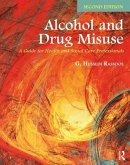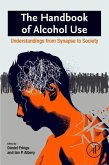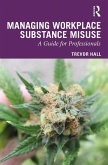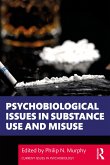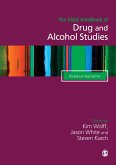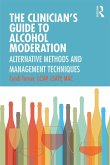G. Hussein Rassool (Australia Charles Sturt University)
Alcohol and Drug Misuse
A Guide for Health and Social Care Professionals
G. Hussein Rassool (Australia Charles Sturt University)
Alcohol and Drug Misuse
A Guide for Health and Social Care Professionals
- Broschiertes Buch
- Merkliste
- Auf die Merkliste
- Bewerten Bewerten
- Teilen
- Produkt teilen
- Produkterinnerung
- Produkterinnerung
This comprehensive textbook provides an accessible and skills-oriented introduction to alcohol and substance misuse for healthcare students and practitioners new to the field.
Andere Kunden interessierten sich auch für
![Alcohol and Drug Misuse Alcohol and Drug Misuse]() G. Hussein Rassool (Australia Charles Sturt University)Alcohol and Drug Misuse64,99 €
G. Hussein Rassool (Australia Charles Sturt University)Alcohol and Drug Misuse64,99 €![The Handbook of Alcohol Use The Handbook of Alcohol Use]() Daniel FringsThe Handbook of Alcohol Use148,99 €
Daniel FringsThe Handbook of Alcohol Use148,99 €![Managing Workplace Substance Misuse Managing Workplace Substance Misuse]() Trevor HallManaging Workplace Substance Misuse49,99 €
Trevor HallManaging Workplace Substance Misuse49,99 €![Psychobiological Issues in Substance Use and Misuse Psychobiological Issues in Substance Use and Misuse]() Psychobiological Issues in Substance Use and Misuse60,99 €
Psychobiological Issues in Substance Use and Misuse60,99 €![The SAGE Handbook of Drug & Alcohol Studies The SAGE Handbook of Drug & Alcohol Studies]() The SAGE Handbook of Drug & Alcohol Studies190,99 €
The SAGE Handbook of Drug & Alcohol Studies190,99 €![Handbook of Emergency Psychiatry Handbook of Emergency Psychiatry]() Hani R. KhouzamHandbook of Emergency Psychiatry103,99 €
Hani R. KhouzamHandbook of Emergency Psychiatry103,99 €![The Clinician's Guide to Alcohol Moderation The Clinician's Guide to Alcohol Moderation]() Cyndi TurnerThe Clinician's Guide to Alcohol Moderation50,99 €
Cyndi TurnerThe Clinician's Guide to Alcohol Moderation50,99 €-
-
-
This comprehensive textbook provides an accessible and skills-oriented introduction to alcohol and substance misuse for healthcare students and practitioners new to the field.
Hinweis: Dieser Artikel kann nur an eine deutsche Lieferadresse ausgeliefert werden.
Hinweis: Dieser Artikel kann nur an eine deutsche Lieferadresse ausgeliefert werden.
Produktdetails
- Produktdetails
- Verlag: Taylor & Francis Ltd
- 3 ed
- Seitenzahl: 450
- Erscheinungstermin: 5. November 2024
- Englisch
- Abmessung: 210mm x 298mm x 28mm
- Gewicht: 1194g
- ISBN-13: 9781032598697
- ISBN-10: 1032598697
- Artikelnr.: 70733560
- Herstellerkennzeichnung
- Libri GmbH
- Europaallee 1
- 36244 Bad Hersfeld
- gpsr@libri.de
- Verlag: Taylor & Francis Ltd
- 3 ed
- Seitenzahl: 450
- Erscheinungstermin: 5. November 2024
- Englisch
- Abmessung: 210mm x 298mm x 28mm
- Gewicht: 1194g
- ISBN-13: 9781032598697
- ISBN-10: 1032598697
- Artikelnr.: 70733560
- Herstellerkennzeichnung
- Libri GmbH
- Europaallee 1
- 36244 Bad Hersfeld
- gpsr@libri.de
G. Hussein Rassool is Professor of Isl¿mic Psychology at the Centre for Isl¿mic Studies and Civilisations, Charles Sturt University, Australia. He is also Director of Studies at the Department of Isl¿mic Psychology, Psychotherapy, and Counselling, Al Balagh Academy, and Chair of Al Balagh Institute of Isl¿mic Psychology Research. He is a Fellow of the International Association of Isl¿mic Psychology (FIAIP) and the Royal Society of Public Health (FRSPH) and Professional membership of the International Association of Substance Use. He works as a part-time Isl¿mic psychotherapist. He is one of the leading academics in the areas of Isl¿mic psychology and psychotherapy and is involved in the development of the first BSc Isl¿mic psychology at the International Open University. His research interests include psychosocial and spiritual problems in relation to mental health, psychosocial and spiritual interventions, indigenous psychology, Isl¿mic counselling and psychotherapy, and Isl¿mic ethics in psychology. He has published over 22 books, as well as over 150 papers and reviews in peer-reviewed journals.
Part 1. Alcohol and Drug and global policy initiatives. 1. Demystifying
Terms: Understanding substance-related concepts and disorders. 2. Breaking
stereotypes: Developing self-awareness and attitude. 3. From ancient
rituals to modern addictions: A history of psychoactive substances. 4.
Exploring addiction: models and theoretical perspectives. 5. Exploring
addiction: Understanding nature, patterns, administration and risks. 6.
Global policy initiatives and strategy on alcohol and drugs. Part 2.
Psychoactive substances. 7. Alcohol. 8. Opiates and opioids. 9. Cannabis
and Synthetic Cannabis. 10. Stimulants: amphetamines, cocaine and khat. 11.
Psychedelics: A Journey into Hallucinogenic Drugs. 12. Anabolic steroids,
amyl and butyl nitrite, hypno-sedatives, volatile substances,
over-the-counter drugs, smart and eco drugs. 13. Nicotine addiction,
electronic nicotine delivery systems and Shisha smoking. Part 3. Special
issues and populations. 14. Blood-borne infections. 15. Alcohol and drug
use in women. 16. Mental health problems and substance use disorder:
Co-occurring disorders. 17. Alcohol and drug use in culturally and
linguistically diverse communities. 18. Vulnerable people: the elderly and
homeless and alcohol and drug use. 19. Young people: alcohol and drug
misuse. Part 4. Role, prevention and strategies for change. 20. Generic
role in response to alcohol and drug misuse. 21. Public health approaches
to substance misuse. 22. Strategies in helping people to change. 23.
Working with diversity: cultural competence. Part 5. Care planning and
intervention strategies. 24. Framework for assessment, risk assessment and
screening. 25. Care planning: principles and practice. 26. Psychosocial and
pharmacological interventions. 27. Harm reduction approach. 28.
Intoxication and overdose: health interventions. 29. Drug misuse:
pharmacological and psychosocial interventions. 30. Alcohol misuse:
pharmacological and psychosocial interventions. 31. Smoking cessation:
health interventions. 32. Epilogue.
Terms: Understanding substance-related concepts and disorders. 2. Breaking
stereotypes: Developing self-awareness and attitude. 3. From ancient
rituals to modern addictions: A history of psychoactive substances. 4.
Exploring addiction: models and theoretical perspectives. 5. Exploring
addiction: Understanding nature, patterns, administration and risks. 6.
Global policy initiatives and strategy on alcohol and drugs. Part 2.
Psychoactive substances. 7. Alcohol. 8. Opiates and opioids. 9. Cannabis
and Synthetic Cannabis. 10. Stimulants: amphetamines, cocaine and khat. 11.
Psychedelics: A Journey into Hallucinogenic Drugs. 12. Anabolic steroids,
amyl and butyl nitrite, hypno-sedatives, volatile substances,
over-the-counter drugs, smart and eco drugs. 13. Nicotine addiction,
electronic nicotine delivery systems and Shisha smoking. Part 3. Special
issues and populations. 14. Blood-borne infections. 15. Alcohol and drug
use in women. 16. Mental health problems and substance use disorder:
Co-occurring disorders. 17. Alcohol and drug use in culturally and
linguistically diverse communities. 18. Vulnerable people: the elderly and
homeless and alcohol and drug use. 19. Young people: alcohol and drug
misuse. Part 4. Role, prevention and strategies for change. 20. Generic
role in response to alcohol and drug misuse. 21. Public health approaches
to substance misuse. 22. Strategies in helping people to change. 23.
Working with diversity: cultural competence. Part 5. Care planning and
intervention strategies. 24. Framework for assessment, risk assessment and
screening. 25. Care planning: principles and practice. 26. Psychosocial and
pharmacological interventions. 27. Harm reduction approach. 28.
Intoxication and overdose: health interventions. 29. Drug misuse:
pharmacological and psychosocial interventions. 30. Alcohol misuse:
pharmacological and psychosocial interventions. 31. Smoking cessation:
health interventions. 32. Epilogue.
Part 1. Alcohol and Drug and global policy initiatives. 1. Demystifying
Terms: Understanding substance-related concepts and disorders. 2. Breaking
stereotypes: Developing self-awareness and attitude. 3. From ancient
rituals to modern addictions: A history of psychoactive substances. 4.
Exploring addiction: models and theoretical perspectives. 5. Exploring
addiction: Understanding nature, patterns, administration and risks. 6.
Global policy initiatives and strategy on alcohol and drugs. Part 2.
Psychoactive substances. 7. Alcohol. 8. Opiates and opioids. 9. Cannabis
and Synthetic Cannabis. 10. Stimulants: amphetamines, cocaine and khat. 11.
Psychedelics: A Journey into Hallucinogenic Drugs. 12. Anabolic steroids,
amyl and butyl nitrite, hypno-sedatives, volatile substances,
over-the-counter drugs, smart and eco drugs. 13. Nicotine addiction,
electronic nicotine delivery systems and Shisha smoking. Part 3. Special
issues and populations. 14. Blood-borne infections. 15. Alcohol and drug
use in women. 16. Mental health problems and substance use disorder:
Co-occurring disorders. 17. Alcohol and drug use in culturally and
linguistically diverse communities. 18. Vulnerable people: the elderly and
homeless and alcohol and drug use. 19. Young people: alcohol and drug
misuse. Part 4. Role, prevention and strategies for change. 20. Generic
role in response to alcohol and drug misuse. 21. Public health approaches
to substance misuse. 22. Strategies in helping people to change. 23.
Working with diversity: cultural competence. Part 5. Care planning and
intervention strategies. 24. Framework for assessment, risk assessment and
screening. 25. Care planning: principles and practice. 26. Psychosocial and
pharmacological interventions. 27. Harm reduction approach. 28.
Intoxication and overdose: health interventions. 29. Drug misuse:
pharmacological and psychosocial interventions. 30. Alcohol misuse:
pharmacological and psychosocial interventions. 31. Smoking cessation:
health interventions. 32. Epilogue.
Terms: Understanding substance-related concepts and disorders. 2. Breaking
stereotypes: Developing self-awareness and attitude. 3. From ancient
rituals to modern addictions: A history of psychoactive substances. 4.
Exploring addiction: models and theoretical perspectives. 5. Exploring
addiction: Understanding nature, patterns, administration and risks. 6.
Global policy initiatives and strategy on alcohol and drugs. Part 2.
Psychoactive substances. 7. Alcohol. 8. Opiates and opioids. 9. Cannabis
and Synthetic Cannabis. 10. Stimulants: amphetamines, cocaine and khat. 11.
Psychedelics: A Journey into Hallucinogenic Drugs. 12. Anabolic steroids,
amyl and butyl nitrite, hypno-sedatives, volatile substances,
over-the-counter drugs, smart and eco drugs. 13. Nicotine addiction,
electronic nicotine delivery systems and Shisha smoking. Part 3. Special
issues and populations. 14. Blood-borne infections. 15. Alcohol and drug
use in women. 16. Mental health problems and substance use disorder:
Co-occurring disorders. 17. Alcohol and drug use in culturally and
linguistically diverse communities. 18. Vulnerable people: the elderly and
homeless and alcohol and drug use. 19. Young people: alcohol and drug
misuse. Part 4. Role, prevention and strategies for change. 20. Generic
role in response to alcohol and drug misuse. 21. Public health approaches
to substance misuse. 22. Strategies in helping people to change. 23.
Working with diversity: cultural competence. Part 5. Care planning and
intervention strategies. 24. Framework for assessment, risk assessment and
screening. 25. Care planning: principles and practice. 26. Psychosocial and
pharmacological interventions. 27. Harm reduction approach. 28.
Intoxication and overdose: health interventions. 29. Drug misuse:
pharmacological and psychosocial interventions. 30. Alcohol misuse:
pharmacological and psychosocial interventions. 31. Smoking cessation:
health interventions. 32. Epilogue.


